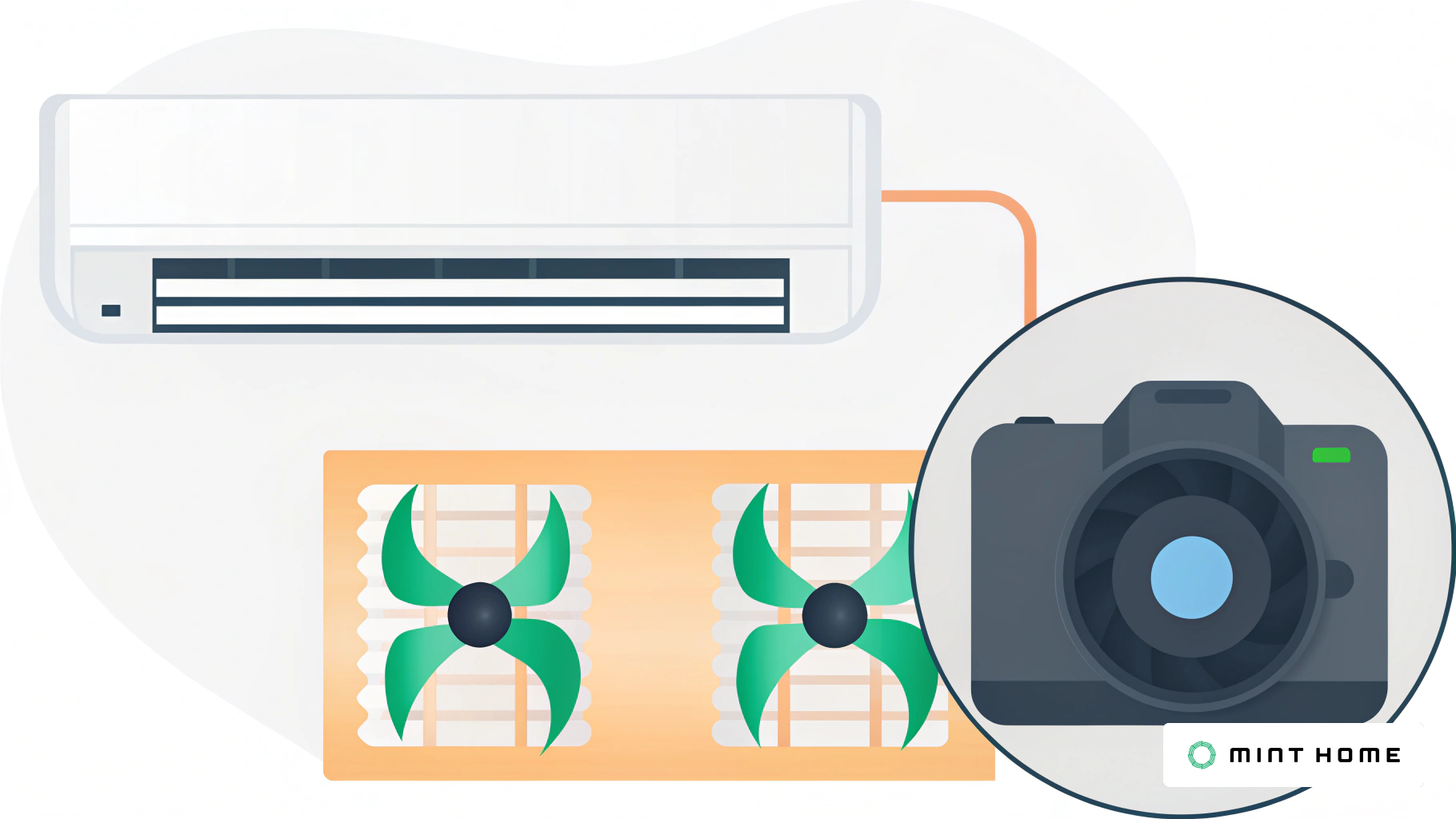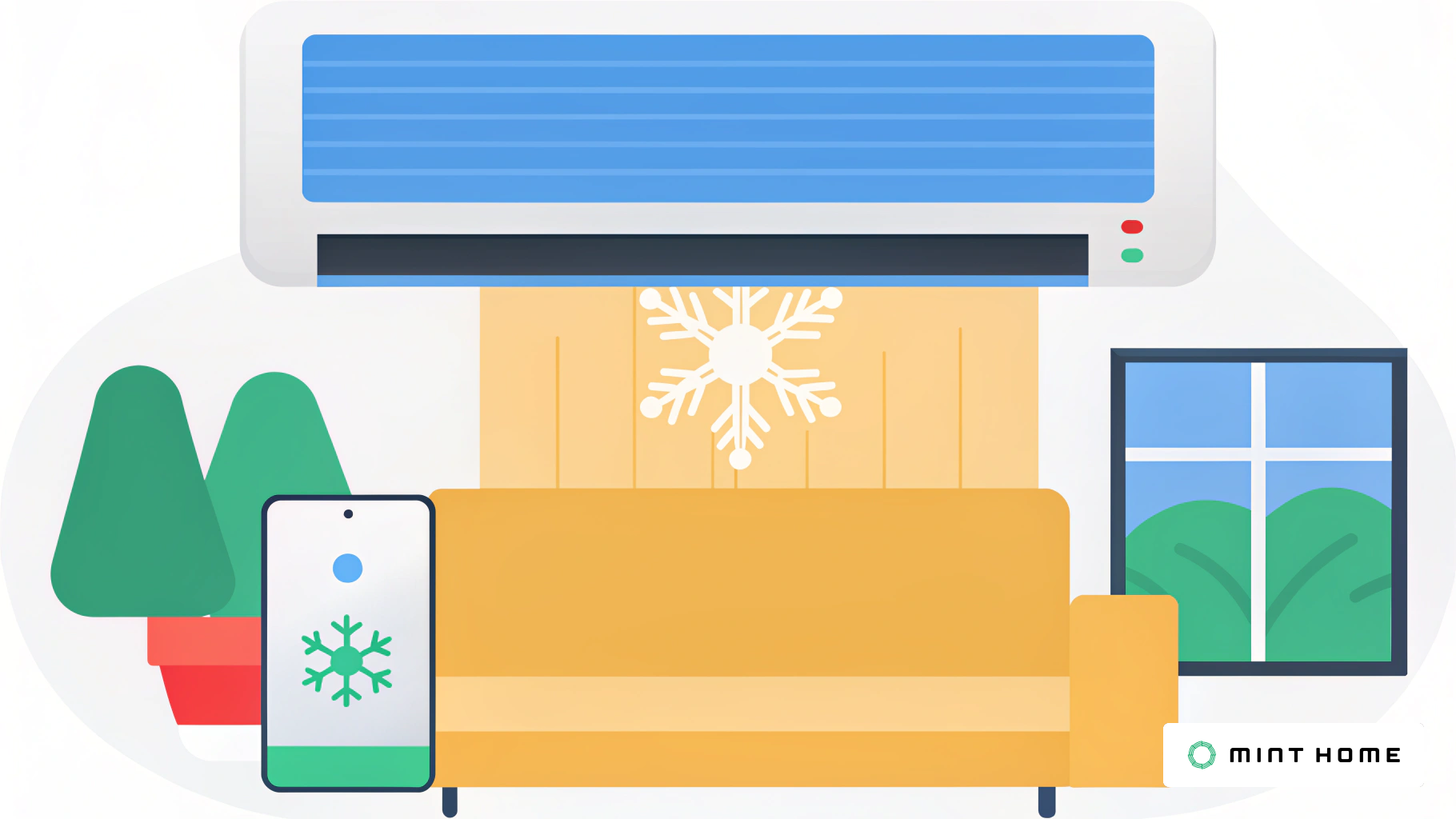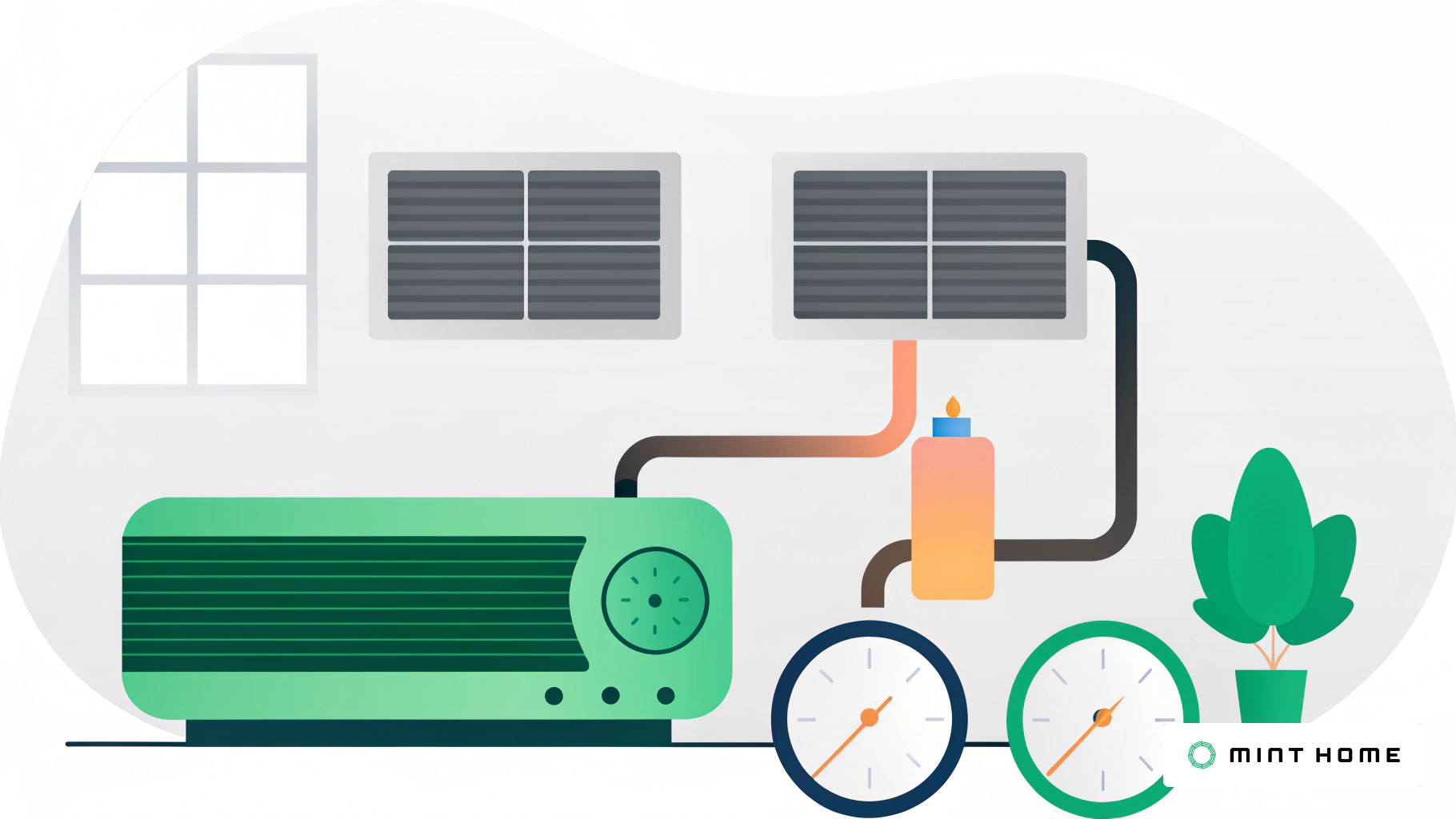Overview
Homeowners should consider recharging their AC systems upon noticing specific signs that indicate low refrigerant levels. These signs include:
- Warm air emanating from vents
- Rising utility bills
- Ice buildup on the unit
- Unusual noises
- Extended cooling cycles
Recognizing these indicators is crucial for maintaining optimal performance and energy efficiency. Regular maintenance not only prolongs the life of the air conditioning unit but also ensures it operates effectively. Therefore, it is essential to pay attention to these symptoms and take action promptly.
Introduction
Understanding the intricacies of a home air conditioning system is essential for homeowners seeking to maintain comfort and efficiency. Regular maintenance not only prolongs the lifespan of the unit but can also lead to significant savings on energy bills. However, many homeowners struggle with knowing how often to recharge their AC systems, often overlooking key signs that indicate a need for attention.
What are the critical indicators that suggest it's time to recharge?
How can one effectively troubleshoot common issues during the process?
By addressing these questions, homeowners can ensure their air conditioning systems operate efficiently and effectively.
Understand Your Home AC System and Its Maintenance Needs
To efficiently manage your home air conditioning setup, it's crucial to understand its primary components: the compressor, evaporator coil, condenser coil, and coolant lines. Each part plays a vital role in the cooling process, and regular maintenance is essential for optimal performance. Here are key maintenance tasks to consider:
- Change Air Filters: Replace or clean filters every 1-3 months to maintain airflow and efficiency. Ignoring this can lead to higher energy usage and reduced performance of the system.
- Inspect Fluid Levels: Regularly check fluid levels to ensure they meet the manufacturer's specifications. Low refrigerant can hinder cooling efficiency and strain the system.
- Clean Coils: Dust and debris can accumulate on the evaporator and condenser coils, significantly reducing efficiency. Cleaning these coils at least once a year is recommended to maintain optimal heat exchange.
- Check Thermostat Settings: Ensure your thermostat is functioning correctly and set to the desired temperature. A faulty thermostat can result in inadequate cooling and higher utility costs. Programmable thermostats can save about $150 a year in energy costs if used properly.
- Schedule Professional Maintenance: Having a professional technician inspect your setup annually can help identify potential issues early, preventing costly repairs down the line. Technicians frequently conduct a Manual J load calculation to ensure your setup is appropriately sized, which is essential for efficiency.
Regular maintenance not only improves the efficiency of your AC unit but also prolongs its lifespan, averaging between 12 to 15 years with proper care. HVAC experts emphasize that well-maintained equipment can last as long as 30 years, greatly delaying the need for expensive replacements. As noted by experts, "Your pocket starts hurting if you don't maintain your unit." Furthermore, savings from cleaned HVAC units can vary from 41% to 60% in fan/blower power usage. By prioritizing these maintenance tasks, homeowners can enhance their AC efficiency and enjoy reduced utility costs while ensuring comfort during extreme temperatures.

Identify Signs That Your Home AC Needs Recharging
Homeowners should remain vigilant regarding several critical indicators that inform them how often to recharge home AC.
- Warm Air from Vents: If your AC is blowing warm air instead of cool, it likely signals low refrigerant levels, suggesting you should consider how often to recharge home AC. This common issue can lead to discomfort and should be addressed promptly.
- Rising Utility Bills: A sudden surge in costs often indicates how often to recharge home AC, as it may be overworking due to inadequate coolant. This can result in higher monthly expenses. Statistics reveal that approximately 30% of homeowners experience increased energy bills due to AC issues, underscoring the importance of regular maintenance.
- Ice Buildup: The presence of ice on the evaporator coil or cooling lines is a clear sign of low coolant, which indicates how often to recharge home AC, as the system is not functioning properly.
- Hissing or Bubbling Noises: Uncommon sounds may indicate a coolant leak, which requires immediate attention and can inform you about how often to recharge home AC to restore efficiency. As Victor Botnari, owner of Universal Motor Cars, notes, "If you hear strange noises, it could point to a failing compressor or a blocked condenser."
- Extended Cooling Cycles: If your AC runs longer than normal without successfully cooling your home, it may be struggling due to insufficient coolant levels, impacting how often to recharge home AC. Low refrigerant levels can result in greater power usage and higher utility costs.
By identifying these signs early, homeowners can take swift action to refresh their AC units, ensuring continued comfort and energy efficiency. Recognizing AC problems promptly can provide practical context, highlighting the significance of attentiveness in preserving HVAC units.

Troubleshoot Common Issues During AC Recharge
When recharging your AC unit, it's important to understand how often to recharge home AC as several common issues may arise. Understanding how to troubleshoot them effectively is essential for maintaining your system's performance.
- Low Pressure Reading: If the low-pressure gauge indicates a reading below the recommended level, it’s crucial to check for leaks in the system. Utilizing a UV leak detection kit can help identify any leaks that may be present. Research indicates that a considerable percentage of homeowners experience low pressure readings in their AC units, underscoring the necessity of this step.
- Refrigerant Not Entering the Network: If refrigerant isn’t flowing into the network, ensure that the service valve is open and that all connections are secure. If the setup is under a vacuum, it may require purging before recharging.
- Compressor Not Engaging: If the compressor does not activate, examine the electrical connections and ensure that the unit is not overcharged. An overcharged setup can cause the compressor to shut down to avoid damage.
- Unusual Noises: Hissing or bubbling sounds during the recharge process may indicate a refrigerant leak. If these noises occur, halt the recharge and inspect the system for any leaks. Additionally, unusual sounds can signal possible mechanical problems that should be addressed swiftly.
- Inconsistent Cooling: After recharging, if the AC still fails to cool effectively, the issue may lie elsewhere, such as a clogged filter or malfunctioning thermostat. It’s advisable to check these components before concluding that a recharge is necessary. Routine upkeep, such as cleaning soiled condenser coils, can significantly improve cooling efficiency and avert such problems.
By following these troubleshooting steps, homeowners can effectively manage how often to recharge home AC and address the common issues that arise during the AC recharge process, ensuring their system operates smoothly. Incorporating regular maintenance practices is essential for preventing problems and maintaining optimal performance.

Conclusion
Understanding the intricacies of home air conditioning systems is essential for homeowners seeking to maintain comfort and efficiency in their living spaces. Regular maintenance and timely recharging of AC units are crucial for ensuring optimal performance and longevity. By being proactive in these areas, homeowners can avoid costly repairs and enjoy a more comfortable environment.
Key insights include the necessity of routine tasks such as:
- Changing air filters
- Inspecting fluid levels
- Cleaning coils
Have you noticed warm air from vents, rising utility bills, or unusual noises? Recognizing these signs can empower homeowners to act swiftly and prevent further complications. Additionally, troubleshooting common issues during the recharge process is vital for maintaining system integrity and efficiency.
Ultimately, prioritizing regular maintenance and being vigilant about the signs of AC issues not only enhances energy efficiency but also significantly prolongs the lifespan of the unit. Homeowners are encouraged to adopt a comprehensive maintenance checklist and stay informed about their systems to ensure comfort and efficiency year-round. Taking these steps will lead to savings on energy bills and contribute to a more sustainable and enjoyable home environment.
Frequently Asked Questions
What are the main components of a home air conditioning system?
The primary components of a home air conditioning system include the compressor, evaporator coil, condenser coil, and coolant lines.
Why is regular maintenance important for an air conditioning system?
Regular maintenance is essential for optimal performance, as it helps improve efficiency, prolongs the lifespan of the unit, and prevents costly repairs.
How often should air filters be changed or cleaned?
Air filters should be replaced or cleaned every 1-3 months to maintain airflow and efficiency.
What should homeowners do regarding fluid levels in their AC system?
Homeowners should regularly check fluid levels to ensure they meet the manufacturer's specifications, as low refrigerant can hinder cooling efficiency.
How can dust and debris affect the efficiency of an AC unit?
Dust and debris can accumulate on the evaporator and condenser coils, significantly reducing efficiency. Cleaning these coils at least once a year is recommended.
What is the importance of checking thermostat settings?
Ensuring the thermostat is functioning correctly and set to the desired temperature is important, as a faulty thermostat can lead to inadequate cooling and higher utility costs.
How can programmable thermostats help with energy costs?
Programmable thermostats can save about $150 a year in energy costs if used properly.
Why should homeowners schedule professional maintenance for their AC system?
Scheduling professional maintenance annually can help identify potential issues early and ensure the system is appropriately sized, which is essential for efficiency.
What is the average lifespan of a well-maintained air conditioning unit?
A well-maintained air conditioning unit has an average lifespan of 12 to 15 years, but with proper care, it can last as long as 30 years.
What potential savings can result from maintaining an HVAC unit?
Savings from cleaned HVAC units can vary from 41% to 60% in fan/blower power usage, leading to reduced utility costs.
List of Sources
- Understand Your Home AC System and Its Maintenance Needs
- El Paso HVAC experts stress maintenance as triple-digit heat impacts cooling systems (https://kfoxtv.com/news/local/el-paso-hvac-experts-stress-maintenance-as-triple-digit-heat-impacts-cooling-systems)
- Air-Conditioning and Heat Pump Efficiency 101 | AHRI (https://ahrinet.org/certification/cee-directory/air-conditioning-and-heat-pump-efficiency-101)
- The Importance of Regular HVAC Maintenance for Home Comfort and Efficiency - Pampa News (https://thepampanews.com/premium/napsnet/stories/the-importance-of-regular-hvac-maintenance-for-home-comfort-and-efficiency,122817)
- Today in Energy - U.S. Energy Information Administration (EIA) (https://eia.gov/todayinenergy/detail.php?id=52558)
- Maintaining your HVAC system to upkeep your home (https://local21news.com/community/cbs21-home-show/maintaining-your-hvac-system-to-upkeep-your-home-hb-home-service-team-sponsored-)
- Identify Signs That Your Home AC Needs Recharging
- How To Keep Your Ac From Freezing In The Summer - MRCOOL® (https://mrcool.com/blog/how-to-keep-your-ac-from-freezing-in-the-summer)
- Seven Signs of Low Refrigerant in a System (https://achrnews.com/articles/137329-seven-signs-of-low-refrigerant-in-a-system)
- Why do HVAC systems often fail during peak usage times? (https://quora.com/Why-do-HVAC-systems-often-fail-during-peak-usage-times)
- 9 Reasons Your AC Isn't Blowing Cold Air | John Henry (https://jhlincoln.com/9-reasons-your-air-conditioning-system-is-not-blowing-out-cold-air)
- Las Vegas drivers urged to check car A/C before summer heat arrives (https://ktnv.com/news/las-vegas-drivers-urged-to-check-car-ac-before-summer-heat-arrives)
- Troubleshoot Common Issues During AC Recharge
- Common AC Problems and Their Solutions in 2025 | Friendly A/C (https://friendlyac.com/common-ac-problems-and-their-solutions-in-2025)
- Common AC Problems and Their Solutions in 2025 (https://anytimeserviceguys.com/common-ac-problems-and-their-solutions-in-2025)
- HVAC prices rise over refrigerant shortage (https://newsnationnow.com/business/your-money/refrigerant-shortage-air-conditioning-costs)
- Air Conditioning Statistics | Payless Power (https://paylesspower.com/blog/air-conditioning-statistics)
- 12 Shocking Air Conditioning Statistics (And 3 Money-Saving Tips) (https://warnerservice.com/blog/shocking-air-conditioning-statistics)




